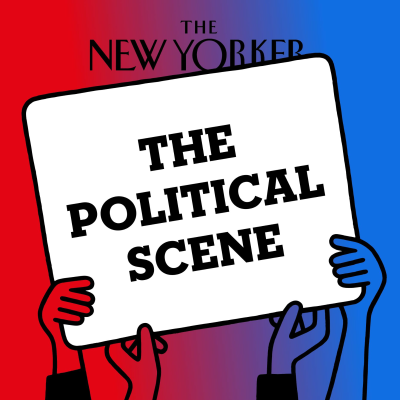
The Political Scene | The New Yorker
Podcast von WNYC Studios and The New Yorker
Join The New Yorker’s writers and editors for reporting, insight, and analysis of the most pressing political issues of our time. On Mondays, David Remnick, the editor of The New Yorker, presents conversations and feature stories about current events. On Wednesdays, the senior editor Tyler Foggatt goes deep on a consequential political story via far-reaching interviews with staff writers and outside experts. And, on Fridays, the staff writers Susan B. Glasser, Jane Mayer, and Evan Osnos discuss the latest developments in Washington and beyond, offering an encompassing understanding of this moment in American politics.
Kostenlos testen für 30 Tage
4,99 € / Monat nach der Testphase.Jederzeit kündbar.
Alle Folgen
853 FolgenThe New Yorker staff writer Katy Waldman joins Tyler Foggatt to discuss Donald Trump’s fondness for A.I.-generated memes and what it tells us about our current political climate. They talk about how Trump uses these images to bend the cultural narrative to his will, why the MAGA aesthetic is tailor-made for the age of A.I., and how the proliferation of A.I. slop is damaging our brains. This week’s reading: * “Trump Is the Emperor of A.I. Slop [https://www.newyorker.com/culture/critics-notebook/trump-is-the-emperor-of-ai-slop],” by Katy Waldman * “My Brain Finally Broke [https://www.newyorker.com/culture/the-weekend-essay/my-brain-finally-broke],” by Jia Tolentino * “How Is Elon Musk Powering His Supercomputer? [https://www.newyorker.com/news/the-lede/how-is-elon-musk-powering-his-supercomputer],” by Bill McKibben * “Is This the End of the Separation of Church and State? [https://www.newyorker.com/news/the-lede/is-this-the-end-of-the-separation-of-church-and-state],” by Ruth Marcus * “Twelve Migrants Sharing a Queens Apartment [https://www.newyorker.com/magazine/2025/05/12/twelve-migrants-sharing-a-queens-apartment],” by Jordan Salama * “How Russia and Ukraine Are Playing Trump’s Blame Game [https://www.newyorker.com/news/the-lede/how-russia-and-ukraine-are-playing-trumps-blame-game],” by Joshua Yaffa To discover more podcasts from The New Yorker, visit newyorker.com/podcasts [http://newyorker.com/podcasts]. To send feedback on this episode, write to themail@newyorker.com [themail@newyorker.com]. Learn about your ad choices: dovetail.prx.org/ad-choices [https://dovetail.prx.org/ad-choices]
For a long time, Republicans and many Democrats espoused some version of free-trade economics that would have been familiar to Adam Smith. But Donald Trump breaks radically with that tradition, embracing a form of protectionism that resulted in his extremely broad and chaotic tariff proposals, which tanked markets and deepened the fear of a global recession. John Cassidy writes The New Yorker’s The Financial Page [https://www.newyorker.com/news/the-financial-page] column, and he’s been covering economics for the magazine since 1995. His new book, “Capitalism and Its Critics: A History [https://us.macmillan.com/books/9780374601096/capitalismanditscritics/],” takes a long view of these debates, and breaks down some of the arguments that have shaped the U.S.’s current economic reality. “Capitalism itself has put its worst face forward in the last twenty or thirty years through the growth of huge monopolies which seem completely beyond any public control or accountability,” Cassidy tells David Remnick. “And young people—they look at capitalism and the economy through the prism of environmentalism now in a way that they didn’t in our generation.” Learn about your ad choices: dovetail.prx.org/ad-choices [https://dovetail.prx.org/ad-choices]
The Washington Roundtable discusses the unprecedented corruption of the federal government, including Trump Administration members’ self-enrichment through cryptocurrency schemes and the inaugural committee, and the gutting of parts of the government that are responsible for rooting out self-dealing from public life. It is a level of corruption so “outright” and “brazen,” the staff writer Evan Osnos says, that it constitutes “a new phase in American politics.” This week’s reading: * “Mike Waltz Learns the Hard Truth About Serving Donald Trump [https://www.newyorker.com/news/letter-from-trumps-washington/mike-waltz-learns-the-hard-truth-about-serving-donald-trump],” by Susan B. Glasser * “How Donald Trump Is Expanding His Authority While Shrinking the Government [https://www.newyorker.com/news/fault-lines/how-donald-trump-is-expanding-his-authority-while-shrinking-the-government],” by Jon Allsop * “What Canadians Heard—and Americans Didn’t [https://www.newyorker.com/news/the-lede/what-canadians-heard-and-americans-didnt],” by Adam Gopnik * “Trump’s Deportees to El Salvador Are Now ‘Ghosts’ in U.S. Courts [https://www.newyorker.com/news/the-lede/trumps-deportees-to-el-salvador-are-now-ghosts-in-us-courts],” by Jonathan Blitzer * “Will the Trump Tariffs Devastate the Whiskey Industry? [https://www.newyorker.com/news/the-lede/will-the-trump-tariffs-devastate-the-whiskey-industry],” by Charles Bethea * “A Life-Changing Scientific Study Ended by the Trump Administration [https://www.newyorker.com/news/the-lede/a-life-changing-scientific-study-ended-by-the-trump-administration],” by Dhruv Khullar * “The Bureaucratic Nightmares of Being Trans Under Trump [https://www.newyorker.com/news/the-lede/the-bureaucratic-nightmares-of-being-trans-under-trump],” by Grace Byron * “How Trump Is Helping Tycoons Exploit the Pandemic [https://www.newyorker.com/magazine/2020/07/20/how-trump-is-helping-tycoons-exploit-the-pandemic],” by Jane Mayer (July, 2020) To discover more podcasts from The New Yorker, visit newyorker.com/podcasts. To send in feedback on this episode, write to themail@newyorker.com [themail@newyorker.com] with “The Political Scene” in the subject line. Learn about your ad choices: dovetail.prx.org/ad-choices [https://dovetail.prx.org/ad-choices]
In a new recurring series on The Political Scene, the staff writer Andrew Marantz joins Tyler Foggatt to assess the status of American democracy. How does one distinguish—in the blizzard of federal workforce cuts, deportations, and executive orders that have defined the first hundred days of Donald Trump’s second term—actions that are offensive to some, but fundamentally within the power of the executive, from moves which threaten the integrity of our system of government? Marantz applies the lens of Viktor Orbán’s Hungary to analyze where we may be in a potential slide toward autocracy, exploring ways in which Trump has even gone beyond the “Orbán playbook.” Marantz and Foggatt also discuss what it would take to reverse democratic backsliding. This week’s reading: * “Is It Happening Here? [https://www.newyorker.com/magazine/2025/05/05/is-the-us-becoming-an-autocracy],” by Andrew Marantz * “One Hundred Days of Ineptitude [https://www.newyorker.com/magazine/2025/05/05/a-hundred-days-of-ineptitude],” by David Remnick * “The Bureaucratic Nightmares of Being Trans Under Trump [https://www.newyorker.com/news/the-lede/the-bureaucratic-nightmares-of-being-trans-under-trump],” by Grace Byron To discover more podcasts from The New Yorker, visit newyorker.com/podcasts [http://newyorker.com/podcasts]. To send feedback on this episode, write to themail@newyorker.com [themail@newyorker.com]. Learn about your ad choices: dovetail.prx.org/ad-choices [https://dovetail.prx.org/ad-choices]
As Donald Trump continues to launch unprecedented and innovative attacks on immigrants, civic institutions, and the rule of law, the Democratic response has been—in the eyes of many observers—tepid and inadequate. One answer to the sense of desperation came from Senator Cory Booker, who, on March 31st, launched a marathon speech on the Senate floor, calling on Americans to resist authoritarianism. Booker beat the record previously held by Senator Strom Thurmond’s twenty-four-hour-long filibuster of the Civil Rights Act, in 1957, and he spoke in detail about Americans who are in desperate straits because of federal job cuts and budget slashing. “We knew . . . if I could last twenty-four hours and eighteen minutes, that we could potentially command some attention from the public,” Booker tells David Remnick. “That’s the key here . . . to deal with the poverty of empathy we have in our nation right now.” Yet Booker bridles as Remnick asks about Democratic strategy to resist the Administration’s attacks. Instead, he emphasized the need for “Republicans of good conscience” to step up. “Playing this as a partisan game cheapens the larger cause of the country,” he argues. “This is the time that America needs moral leadership, and not political leadership.” Learn about your ad choices: dovetail.prx.org/ad-choices [https://dovetail.prx.org/ad-choices]
Kostenlos testen für 30 Tage
4,99 € / Monat nach der Testphase.Jederzeit kündbar.
Exklusive Podcasts
Werbefrei
Alle frei verfügbaren Podcasts
Hörbücher
20 Stunden / Monat

































